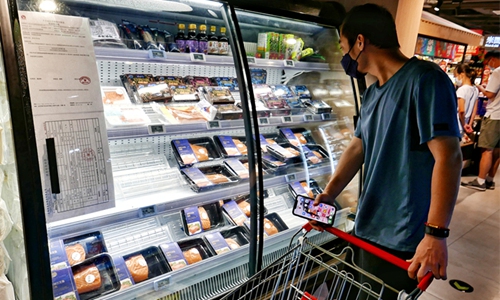Cold-chain food importers are asked to strengthen supervision
By Yin Yeping Source: Global Times Published: 2020/9/28 16:27:40

Fresh salmon at an Alibaba's Hema Fresh store in Beijing's Shijingshan District on July 28, 2020 Photo: Li Hao/GT
Chinese companies importing cold chain food from abroad are asked to strengthen supervision measures, to avoid importing food products from countries and regions seriously affected by the pandemic.Enterprises should strengthen management of imported cold chains and establish a sound early-warning mechanism to prevent importation of the novel coronavirus, said the notice issued by the Beijing Municipal Commerce Bureau.
This came after the discovery of another cluster of COVID-19 infections arriving in China from foreign food enterprises. Chinese customs have lately found the nucleic acid tests of cold chain food coming back positive for coronavirus on imported products at Qingdao port.
Between June and September, frozen food products have repeatedly been found to cause a wave of new outbreaks, such as the one at Beijing's Xinfadi market, the Dalian Kaiyang World Seafood company in Dalian and Alibaba's Hema Fresh grocery store in Shenzhen, arousing public concern over the risk of imported foods.
Fan Xubing, president of seafood importer Beijing Seabridge, told the Global Times on Monday that the government notice was the right thing to do, adding that it was better to reduce the systemic risks of importing cold chain food, rather than tackling one case at a time.
Since July 10, around 13 novel coronavirus cases related to the cold chains have been found across China, media reported.
In order to strengthen prevention and control during the epidemic, central and local governments have launched a series of measures targeting imported food chains.
The new regulations from China Customs and the Ministry of Transport include measures that require companies to make full use of information technology to strengthen traceability management.
Tianjin authorities urged food producers and marketers to establish and implement a traceability system for cold chain foods to ensure they know where the food came from, and punish cold chain foods of unknown origin in accordance with the law.
The government in East China's Zhejiang Province has also strengthened its cold chain food tracing methods, especially from countries and regions highly affected by the epidemic, by requesting that the source code of relevant cold chain food be attached to the product packaging and clearly visible.
Business representatives approached by the Global Times expressed support for the authorities' new measures. Others believe they will need to think twice about importing cold chain food from regions hit hardest by the pandemic.
"The reason food from these countries is being exported to China in such large numbers in the first place is due to high demand as well as its comparative advantages of price and value," said Fan, noting that it is important to carefully consider not just the market price but the quality of products when considering alternative sources.
Posted in: MARKETS